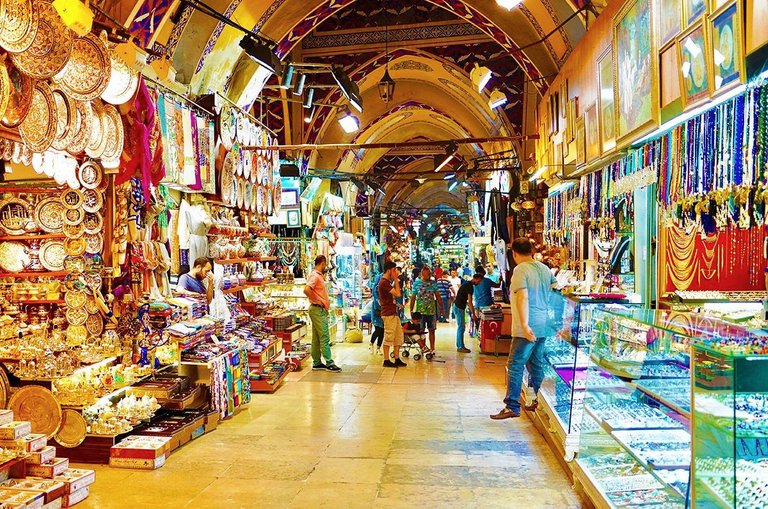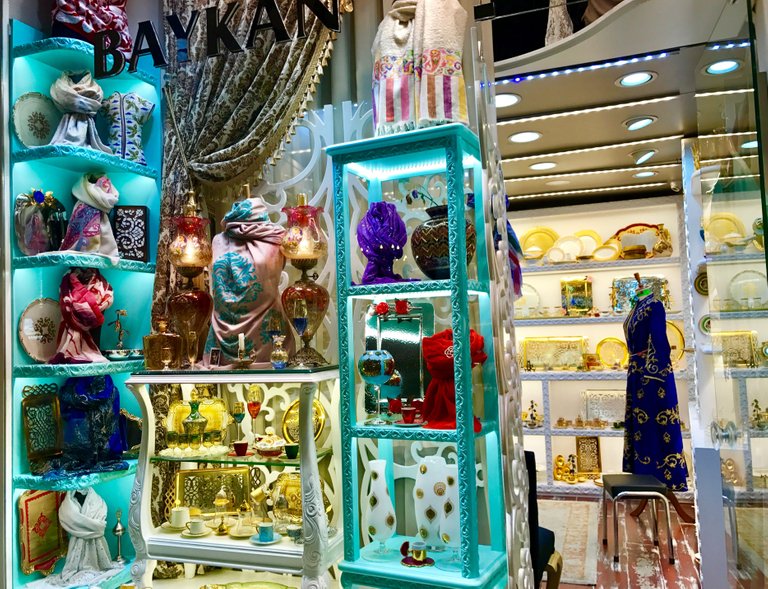Every time I visit a city, I like to find the places which capture the heart and soul of the city. It doesn't have to be the most recognisable landmarks (although they happen to be a lot of the time). They can be places which intertwine with the local people, through tradition, or habitual way of life. Some of the most interesting places I've visited all over the world are places the locals go to on a day to day basis, because it is a part of their life, their routine.The Grand Bazaar is one of the places that fit my criteria. Labelled as one of the first shopping malls in the world, The Grand Bazaar is home to over 5000 shops and 61 covered streets. To this day, it is one of the largest covered markets in the world covering an area of over 54,000 square meters and will attract several hundred thousand visitors each and everyday. This magnitude of foot traffic has earned the Grand Bazaar a label as the most visited tourist attraction in the world. Is the Grand Bazaar the most awesome, amazing, fascinating, bargain filled market in the world such that it attracts the visitation of nearly all tourists who pass by Turkey?Well, let's look around and find out!The first thing you'll realise is that the Grand Bazaar has many entrances, 18 to be exact. You can enter from nearly all sides depending on where you're setting out from. Some of the entrances have archway style gates whilst others are just door like cut outs.
Once inside, I was very quickly overwhelmed by large it really is. The covered "streets" seem to extend with no end, with shops filling up both sides of every street.
The items in the shops vary quite a bit. At the beginning, I thought it was a jewellery market because the street I walked through first was famous for it's jewellery (Kalpakcilarbasi Street).Walking further in towards the centre of the market, I realised they sell quite a lot more than that. In-fact, there are lots of locally made Turkish goods to browse through.
As I mentioned earlier, the entire market is covered. Walking around inside feels like navigating around a very large maze. It was however very pleasant looking up, and seeing the Turkish style designs on the ceiling. It's not meant to be a luxury brand market, so the wear and tear is more than forgivable.
One thing you'll quickly realise, is that the Grand Bazaar has become some what a tourist trap these days. Most of the visitors are tourists and so most of the products on sale are also geared towards tourists. Not only are they expensive, many of the stalls sell irrelevant goods that have nothing to do with Istanbul or Turkey.Up until the middle of the 19th Century, the Grand Bazaar was unrivalled for the quality of it's goods. By the late 19th century, commercial successes of western products forced many of the minority shop keepers out of the Bazaar to open shops more frequented by the Europeans.
Here, you can see one of the many shops selling Turkish ceramics, Turkish Teapots and glasses. Interestingly, the shop to it's side is selling counterfeit goods. It's strange that the authorities seem not to care.
I noticed this stall selling golden oil lamps and instantly thought of Genie lamps!So many different kinds of Tea sets to choose from. Some of them are made with glass, others made with porcelain. All of them together look like loot from treasure chest don't you think?These "chandeliers" are quite popular here. They can come in a variety of shapes, sizes and colour. Probably the more popular ones would be the mosaic ones.Although there is a Spice Bazaar specialising in Turkish spices, there are also stalls selling spices here too. They will happily let you you taste, or try them but you'll find it hard to leave. It's a very mercantile environment!These are the mosaic chandelier globes I mentioned before. Lovely patterns, and vibrant colours make them stand out amongst the opaque coloured ones.How could I forget the Nargile Pipes also known as Shisha.
It's not just copper ware, and ceramics, you'll also find some stalls selling textiles.This is one selling table runners. They are hand made with lots of intricate patterns and embroidery.One of the many carpet and rugs stalls. This is probably the most popular type of good I've seen inside the Bazaar and indeed in stalls all over Istanbul and many other parts of Turkey.For the sugar fiends, there is a large stall of all the Turkish delights you could imagine.You could spend an entire day or more at the Grand Bazaar, exploring deeper into the maze like market but you'll quickly realise that most of the products are the same from stall to stall. There isn't too much variety at the end of the day and there comes a point where pushing and shoving to move around, whilst fending off eager hustling shop keepers becomes tiring. A few hours is more than enough to satisfy your fascination and curiosity of the place, not to mention there are absolutely zero toilet facilities inside.
3
Travel with me #96 : The Grand Bazaar and Taksim Square!
sweetsssj (75) in travel • yesterday
Dear Steemit friends :
Every time I visit a city, I like to find the places which capture the heart and soul of the city. It doesn't have to be the most recognisable landmarks (although they happen to be a lot of the time). They can be places which intertwine with the local people, through tradition, or habitual way of life. Some of the most interesting places I've visited all over the world are places the locals go to on a day to day basis, because it is a part of their life, their routine.The Grand Bazaar is one of the places that fit my criteria. Labelled as one of the first shopping malls in the world, The Grand Bazaar is home to over 5000 shops and 61 covered streets. To this day, it is one of the largest covered markets in the world covering an area of over 54,000 square meters and will attract several hundred thousand visitors each and everyday. This magnitude of foot traffic has earned the Grand Bazaar a label as the most visited tourist attraction in the world. Is the Grand Bazaar the most awesome, amazing, fascinating, bargain filled market in the world such that it attracts the visitation of nearly all tourists who pass by Turkey?Well, let's look around and find out!The first thing you'll realise is that the Grand Bazaar has many entrances, 18 to be exact. You can enter from nearly all sides depending on where you're setting out from. Some of the entrances have archway style gates whilst others are just door like cut outs.Once inside, I was very quickly overwhelmed by large it really is. The covered "streets" seem to extend with no end, with shops filling up both sides of every street.The items in the shops vary quite a bit. At the beginning, I thought it was a jewellery market because the street I walked through first was famous for it's jewellery (Kalpakcilarbasi Street).Walking further in towards the centre of the market, I realised they sell quite a lot more than that. In-fact, there are lots of locally made Turkish goods to browse through.As I mentioned earlier, the entire market is covered. Walking around inside feels like navigating around a very large maze. It was however very pleasant looking up, and seeing the Turkish style designs on the ceiling. It's not meant to be a luxury brand market, so the wear and tear is more than forgivable.One thing you'll quickly realise, is that the Grand Bazaar has become some what a tourist trap these days. Most of the visitors are tourists and so most of the products on sale are also geared towards tourists. Not only are they expensive, many of the stalls sell irrelevant goods that have nothing to do with Istanbul or Turkey.Up until the middle of the 19th Century, the Grand Bazaar was unrivalled for the quality of it's goods. By the late 19th century, commercial successes of western products forced many of the minority shop keepers out of the Bazaar to open shops more frequented by the Europeans.Here, you can see one of the many shops selling Turkish ceramics, Turkish Teapots and glasses. Interestingly, the shop to it's side is selling counterfeit goods. It's strange that the authorities seem not to care.I noticed this stall selling golden oil lamps and instantly thought of Genie lamps!So many different kinds of Tea sets to choose from. Some of them are made with glass, others made with porcelain. All of them together look like loot from treasure chest don't you think?These "chandeliers" are quite popular here. They can come in a variety of shapes, sizes and colour. Probably the more popular ones would be the mosaic ones.Although there is a Spice Bazaar specialising in Turkish spices, there are also stalls selling spices here too. They will happily let you you taste, or try them but you'll find it hard to leave. It's a very mercantile environment!These are the mosaic chandelier globes I mentioned before. Lovely patterns, and vibrant colours make them stand out amongst the opaque coloured ones.How could I forget the Nargile Pipes also known as Shisha.It's not just copper ware, and ceramics, you'll also find some stalls selling textiles.This is one selling table runners. They are hand made with lots of intricate patterns and embroidery.One of the many carpet and rugs stalls. This is probably the most popular type of good I've seen inside the Bazaar and indeed in stalls all over Istanbul and many other parts of Turkey.For the sugar fiends, there is a large stall of all the Turkish delights you could imagine.You could spend an entire day or more at the Grand Bazaar, exploring deeper into the maze like market but you'll quickly realise that most of the products are the same from stall to stall. There isn't too much variety at the end of the day and there comes a point where pushing and shoving to move around, whilst fending off eager hustling shop keepers becomes tiring. A few hours is more than enough to satisfy your fascination and curiosity of the place, not to mention there are absolutely zero toilet facilities inside.Taksim SquareTaksim square is another place with very high foot traffic. It's name comes from the fact that it used to be the place where water from the north of Istanbul is collected and then routed to other parts of the city. Thus, the definition of the word "Taksim" - "distribution", makes natural sense.At the centre of the square is The Monument of the Republic. An important monument which was erected to commemorate the formation of the Turkish republic in 1923.The statues of the people standing inside the monument are the founders of the republic. One of the most important figures is Mustafa Kemal Atatürk, who is seen on two sides of the monument at different periods of his life. He was also the person who commissioned work on the monument.








Source: https://steemit.com/travel/@sweetsssj/travel-with-me-96-the-grand-bazaar-and-taksim-square
Not indicating that the content you copy/paste is not your original work could be seen as plagiarism.
Some tips to share content and add value:
Repeated plagiarized posts are considered spam. Spam is discouraged by the community, and may result in action from the cheetah bot.
Creative Commons: If you are posting content under a Creative Commons license, please attribute and link according to the specific license. If you are posting content under CC0 or Public Domain please consider noting that at the end of your post.
If you are actually the original author, please do reply to let us know!
Thank You!
More Info: Abuse Guide - 2017.
TIP: Users plagiarizing the content of other Steemians make great @cheetah chow.
You've clearly stolen this post from https://steemit.com/travel/@sweetsssj/travel-with-me-96-the-grand-bazaar-and-taksim-square
You've been reported to steemcleaners